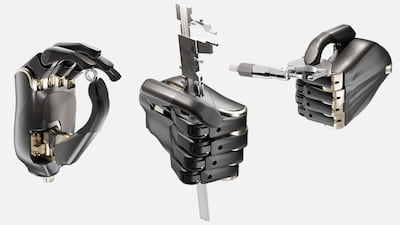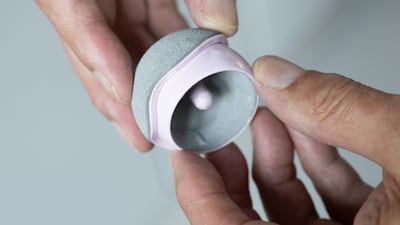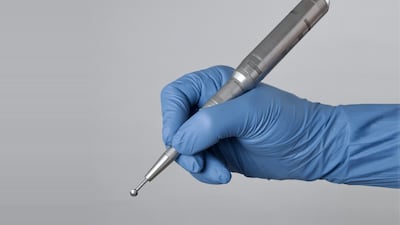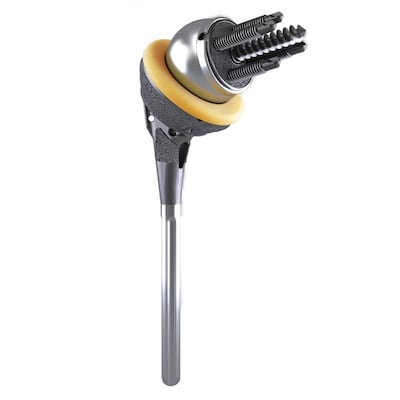Orthopedics
In an era of AI and other advanced computing methods, pure-play mechanical devices could offer better pricing and practicality, according to the CEO of prosthetics company Metacarpal.
The prosthetics market is evolving due to an increase in amputees from war and disease. Unhindr has developed a novel prostetic liner that can reduce the risk of further injury, while Esper is crafting advanced hand implants for Ukraine's front-line soldiers.
J&J announced the separation of its orthopedics unit into a stand-alone company. The firm as a whole expects sales growth of over 5% in 2026. Gabelli analyst Jennie Tsai foresees more consolidation in orthopedics led by Zimmer Biomet, Stryker and DePuy as well as more acquisitions.
At the MedTech Conference, the CEOs of Stryker, Hologic and Insulet said during a panel AI is now central to their business strategies, from creating new medical devices to streamlining workflows and administrative tasks. Stryker’s CEO Kevin Lobo plans a business unit focused on AI-enabled tech.
Microbot wins FDA nod for Liberty, Medtronic’s Hugo showed positive results in hernia repair in clinical studies, Obvius Robotics reports first human procedure with CERTA, Ronovo closes a $67m financing round with JJDC, and Quantum expands Epione CE marking to bone tumors.
After divesting bone healing products in mid-year, Highridge Medical doubled down on its spine capabilities with a triple purchase of technologies from Accelus, bringing access to “Adaptive Geometry.” CEO Rebecca Whitney explained Highridge’s strategy.
Roche Diagnostics, Intuitive Surgical, Abbott and Edwards Lifesciences all acknowledge tariff headwinds, but stress preparedness, resilience and mitigation. Below is look at how management framed the impact in Q1 vs Q2 earnings calls.
The US FDA has provided an update on its breakthrough devices program, now 10 years running. Cardiac, orthopedic, and neurological devices have received the most designations, while only one has been awarded to an obstetrics/gynecology product.
The ceramic device, designed to reduce complications, will be exclusively distributed by Zimmer Biomet and initially available in 30 hospitals, with broader European access expected by 2026.
Medtronic beat first-quarter revenue and EPS estimates, raised guidance, and added two board members and special committees as Elliott takes a stake.
The medtech M&A landscape is experiencing a resurgence fueled by significant capital from private equity and venture firms, says Alex Wakefield, CRO of AcuityMD. Building strong relationships with physicians remains crucial in medtech, and defining an exit strategy early is imperative.
BioWales in London 2025 showcased the efforts healthtech innovators are making to meet investors on their own turf, illustrating changing attitudes and evolving needs.
J&J's EMEA head of digital solutions, Julia Fishman, talks about the major hurdles in scaling digital innovation, tips for clinical adoption and what’s up next on J&J’s innovation road map. Robot-assisted surgery pioneer Ivo Broeders gives his perspective on the difficulties in clinical adoption.
The KINCISE 2 Surgical Automated System aims to “reduce the physical burden on surgeons compared to manual impaction in primary and revision hip and revision knee replacement procedures,” said J&J MedTech.
Surgify Medical’s selective drill tip, Surgify Halo, is “an obvious choice for surgeons,” said Boris Hofmann, head of ZEISS Ventures and lead investor in the company’s series A funding round.
German Bionic’s new exoskeleton Exia helps healthcare practitioners, nurses, and other caregivers to lift and move patients by supporting muscle movement and reducing the risk of injury.
Global investment in consumer healthtech increased by 9% year-over-year in 2024, totaling $4.5bn, with significant interest in mental health solutions, according to Galen Growth. While the first quarter of 2025 saw raised confidence and investments, the Trump administration’s new tariffs and sweeping changes to healthcare have introduced new uncertainties.
A patient, Dena Lawler, is suing Boston Scientific and the US FDA over alleged harm from a spinal stimulator device. Lawler claims inadequate regulatory review allowed dangerous modifications to the device, which then caused her pain and other health issues. She is calling for reconsideration of the device approvals.
At AAOS, orthopedics players showcased their latest robotic-assisted platforms, power tools, 3D printed technologies and software offerings. This article brings you highlights from interviews Medtech Insight conducted on site with representatives from J&J, Stryker, Materialise and Canary Medical.
Enovis has named veteran medtech leader Damien McDonald as its new CEO effective 12 May as the orthopedic company reaffirms first-quarter 2025 revenue guidance of between $555m and $563m. Medtech Insight spoke with Tim Czartoski, Enovis’ president of US surgical and global product and enabling technologies, about the firm’s growth strategy and innovation plans.



















